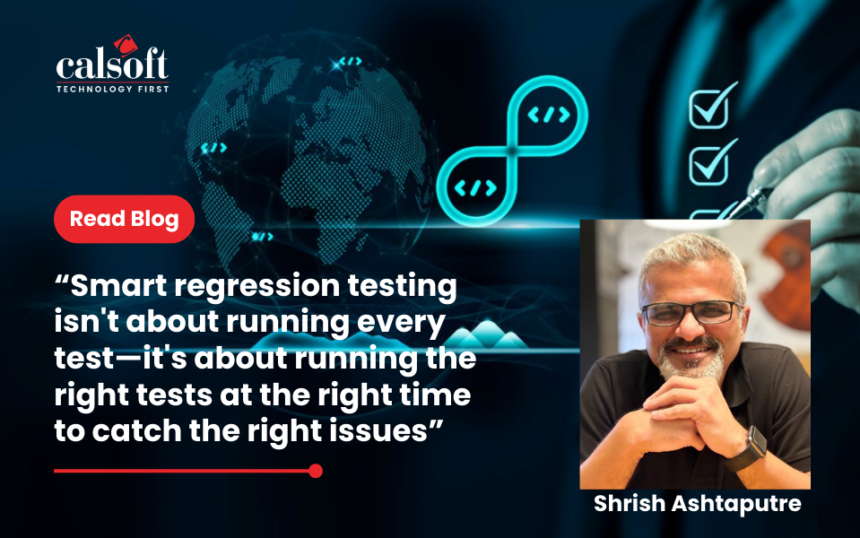In the evolving world of software development, software Quality Assurance (QA) plays a critical role in delivering reliable, user-friendly products. As businesses grow, maintaining software quality becomes more complex. More features, faster releases, and rising user expectations demand a smarter and scalable QA approach. Scaling QA is not about adding more testers; it’s about generating an efficient, flexible process that ensures speed, consistency, and quality at every stage.
One major challenge in QA is regression testing—ensuring that new code changes don’t break existing functionality. As products scale, regression tests often multiply, becoming lengthy and expensive. In many companies, regression tests are usually numerous and longer, which is a real pain area, slowing release cycles and straining QA resources.
But what if regression testing could be transformed from a constraint into a business enabler? That’s exactly what CalTIA, Calsoft’s AI-powered Test Intelligence Platform, is designed to achieve.
Continue reading the blog to learn how to maintain the right balance in regression testing—and how CalTIA’s AI-powered approach helps reduce test effort and time while enhancing overall product quality.
Why Regression Testing Slows Down Development?
Effective regression testing needs to be planned properly. If ignored or overdone, it can lead to late-stage failures or costly delays, consuming time and effort. Maintaining the right balance is necessary to prioritize tests, automate where possible, and regularly review the scope.
Whether performed manually or through scripts, regression testing often becomes a drain on time, cost, and team bandwidth:
- Manual regression testing is labour-intensive and prone to errors.
- Automated regression testing offers speed, but over time, test suites become bloated and redundant.
- Teams often end up running irrelevant tests, extending test cycles unnecessarily.
As software grows, the regression suite grows with it—but not always smartly. This inefficiency leads to slower development, delayed releases, and increased QA costs. Traditional methods aren’t enough.
| Aspect Evaluated | Manual Regression testing | Automated Testing |
| Speed of Execution | Slow due to manual effort | Fast execution via automation scripts |
| Overall Cost | Costly over time due to recurring manual work | Higher upfront investment but reduces cost in the long run |
| Result Accuracy | Vulnerable to mistakes from manual oversight | Consistently accurate with minimal errors |
| Adaptability | More suitable for exploratory and UI-driven testing | Best for structured, predefined testing scenarios |
| Scope of Testing | Limited coverage in complex or large systems | Wide-ranging test coverage through automation |
| Ease of Updates | Quickly adaptable to changes | Requires ongoing maintenance of scripts with any code updates |
| Ideal Use Cases | Best for small projects, frequent UI changes, or creative test scenarios | Suitable for large-scale, repetitive, and regression-based testing |
| Bug Detection Ability | Useful for visual/UI bugs and usability issues | Excellent for catching functional and logic-related bugs |
| Time Efficiency | Time-intensive for repetitive and large-volume testing | Saves time during recurring or long-term testing phases |
From the above comparison, using both manual and automated testing together often gives the most reliable results by balancing human insight with speed and accuracy.
The Shift to Smart, AI-Driven Testing
With the demand for faster GTM via faster test cycles, organizations are incorporating AI in continuous testing and predictive test analytics to optimize testing and enhance productivity. This is where CalTIA comes in.
CalTIA (Calsoft Test Impact Analyzer) is an AI-enabled test automation on-prem solution designed to tackle the complexity of modern regression testing. Instead of running the entire test suite after every code change, CalTIA analyses the impact of each change and runs only the relevant test cases. Know more about CalTIA
CalTIA uses AI/ML to identify exactly which test cases are impacted by your latest code changes, so you can skip the redundant ones without risking product integrity.
This innovation introduces a smart testing solution into the DevOps pipeline, increasing test efficiency while ensuring code reliability.
Key Benefits of CalTIA
CalTIA optimizes your end-to-end testing cycles and increases efficiency with advanced AI/ML capabilities. By executing only the most critical subset of tests, it significantly reduces regression time, speeds up release cycles, and cuts down infrastructure costs. With seamless integration into the CI/CD pipeline, CalTIA transforms Continuous Testing (CT) to the next level. Gain more insights from
- Optimize Testing With AI
CalTIA uses predictive test analytics and AI-driven test selection to map code changes to the most relevant test cases, ensuring smarter, leaner regression cycles. This allows QA teams to run fewer tests without compromising test coverage or accuracy.
- AI-Driven Regression Testing
At its core, CalTIA applies machine learning and historical data to determine test impact. This AI test automation tool eliminates guesswork and ensures teams focus only on what matters most—catching bugs in impacted areas.
- Test Case Generation Using AI
CalTIA can help teams reduce the manual effort involved in test creation by leveraging AI-based software testing to identify and generate high-priority test cases based on change patterns and risk factors. Leverage LLMs to identify gaps in existing test suites and generate missing tests.
- Accelerated Releases
By executing only the necessary test cases, CalTIA shortens test cycles significantly. The result? Faster GTM via faster test cycles—helping teams meet tight deadlines without sacrificing software quality.
- DevOps Testing Automation Ready
CalTIA seamlessly integrates into CI/CD workflows, making it ideal for teams seeking DevOps test automation. Whether you need continuous testing services or faster release validation, CalTIA supports it all.
- Cost and Resource Efficiency
By reducing the test volume and runtime, CalTIA frees up QA bandwidth and lowers operational costs, making it an ideal solution for teams aiming to efficiently scale their automated software testing capabilities.
CalTIA as a Test Intelligence Platform
Think of CalTIA as more than just a test execution tool—it’s a test intelligence platform that understands your application and customizes the testing process intelligently. With the growing adoption of AI-enabled software testing, platforms like CalTIA are becoming integral to QA strategy. Common QA challenges include long regression cycles, high maintenance costs, and lack of test relevance—all of which CalTIA directly addresses.
Discover how CalTIA optimizes your testing process and accelerates product releases — watch our teaser video now.
Real-World Impact
Early adopters of CalTIA’s intelligent test automation platform have reported:
- Achieved 40% Test Cycle optimization
- Up to 50% reduction in regression test execution time
- 36% reduction in infrastructure costs
- High Customizability and Openness
- On-prem processing keeps sensitive information in-house
- Leaner, smarter regression testing
- Greater test accuracy with fewer false positives
Download the case study to gain more insights into
Global Networking Tech Enterprise with CalTIA
Incorporating AI into regression testing is not just about automation—it’s about intelligent test automation that helps you do more with less.
Final Thoughts
As software development accelerates, integrating machine learning for QA and adopting a modern QA automation strategy are essential for maintaining product integrity and accelerating release cycles. With CalTIA’s AI-driven testing solutions, companies can move beyond traditional methods and adopt a smart testing solution that brings speed, accuracy, and efficiency to QA.
By integrating test case generation using AI, selective test execution, and seamless CI/CD integration, CalTIA enables teams to optimize testing, reduce costs, and launch with confidence.
In a world where digital products must evolve continuously, intelligent QA platforms like CalTIA are not just an advantage—they’re essential. For teams aiming to keep pace with innovation while maintaining high standards, CalTIA delivers the future of regression testing today.
Frequently Asked Questions (FAQs)
- What is regression testing?
Regression testing is done to re-run existing test cases to confirm that older code still works as expected after changes are made.
- What is AI-driven regression testing?
AI-driven regression testing uses machine learning algorithms to identify the most relevant test cases based on code changes, optimizing test cycles and resource use.
- Should I choose manual testing, automated testing, or a mix of both?
It depends on your testing needs. Manual testing is ideal for UI validation and exploratory scenarios requiring human insight, while automated testing excels at repetitive, large-scale, and time-sensitive tasks. A hybrid approach combining both often provides the best balance of accuracy, efficiency, and coverage.
- Will AI replace human testers completely?
No, AI supports and enhances testing but doesn’t replace human testers. Humans are still essential for critical thinking, user experience validation, and handling complex or uncertain issues that AI can’t fully understand.
- What are the benefits of using AI in software testing?
AI streamlines testing by automating tasks, speeding up test cycles, and improving accuracy, leading to faster, more reliable software releases.


















